Fox News Flash top headlines for Oct. 26
Fox News Flash top headlines for Oct. 26 are here. Check out what's clicking on Foxnews.com
The Chile's congress had to be evacuated on Friday after anti-government activists forced their way in on Friday during a mass demonstration over inequality within the South American country.
Lawmakers and administrative staff ran out of the legislative building as police fired tear gas at the protesters who made it to the grounds in the port city of Valparaiso.
At least 19 people have died and 7,000 have been detained during the political unrest that ignited over a four-cent increase in subway fares and has transformed into a political movement targeting the country's growing inequality, according to the Guardian.
CHILE'S PRESIDENT ROLLS BACK SUBWAY FARE HIKE AMID PROTESTS

Anti-government protesters face off with police in Valparaiso, Chile, Friday, Oct. 25, 2019. A new round of clashes broke out Friday as demonstrators returned to the streets, dissatisfied with economic concessions announced by the government in a bid to curb a week of deadly violence.(AP Photo/Matias Delacroix)
“There is a failure of the system of political parties in its ability to represent society,” Marta Lagos, the head of Latinobarometro, a nonprofit group in Chile, told the outlet.
In Santiago, the nation's capital, an estimated 1 million people joined a peaceful protest march in what Karla Rubilar, Santiago's governor, described as a "historic" moment for the country.
Demonstrators walked for miles around the city banging pots, blowing whistles and horns, waving flags and calling for political reform. Some held cards urging political and social change as they planned to converge onto Plaza Italia in the capital, according to the BBC.
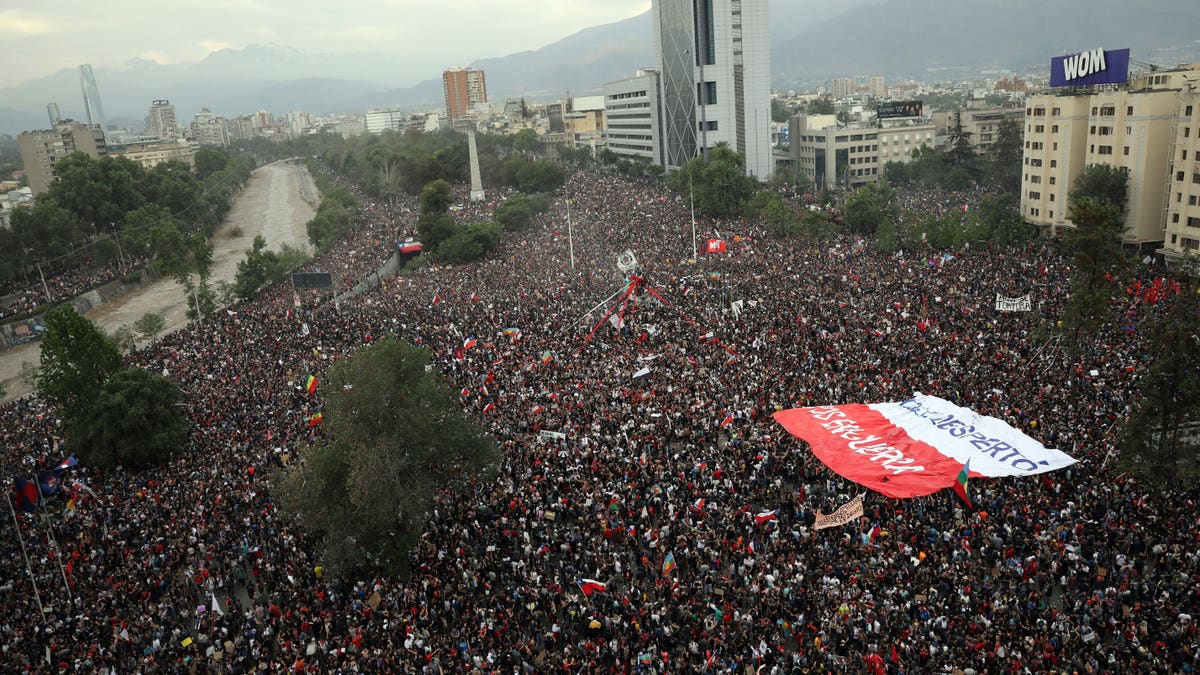
People gather during an anti-government protest in Santiago, Chile, Friday, Oct. 25, 2019. At least 19 people have died in the turmoil that has swept the South American nation. The unrest began as a protest over a 4-cent increase in subway fares and soon morphed into a larger movement over growing inequality in one of Latin America's wealthiest countries. (AP Photo/Rodrigo Abd)
Before the record-setting march, Chile's military had taken over security within Santiago, establishing night-time curfews while enlisting 20,000 police on the streets, the outlet reported.
President Sebastian Pinera said that the government "heard the message."
"We have all changed. Today's joyful and peaceful march, in which Chileans have asked for a more just and unified Chile, opens hopeful paths into the future," he wrote on Twitter. It's unlikely Pinera, who took office last year will resign, according to the Guardian.
He announced on Wednesday a package of reforms they hoped could end the protests, including an increase in basic pension and minimum wage. So far it's done little to end the demonstrations.
Chile is one of the wealthiest countries in Latin American while boasting the worst levels of income equality among the 36 member nations of the Organization for Economic Co-operation and Development, according to the BBC.
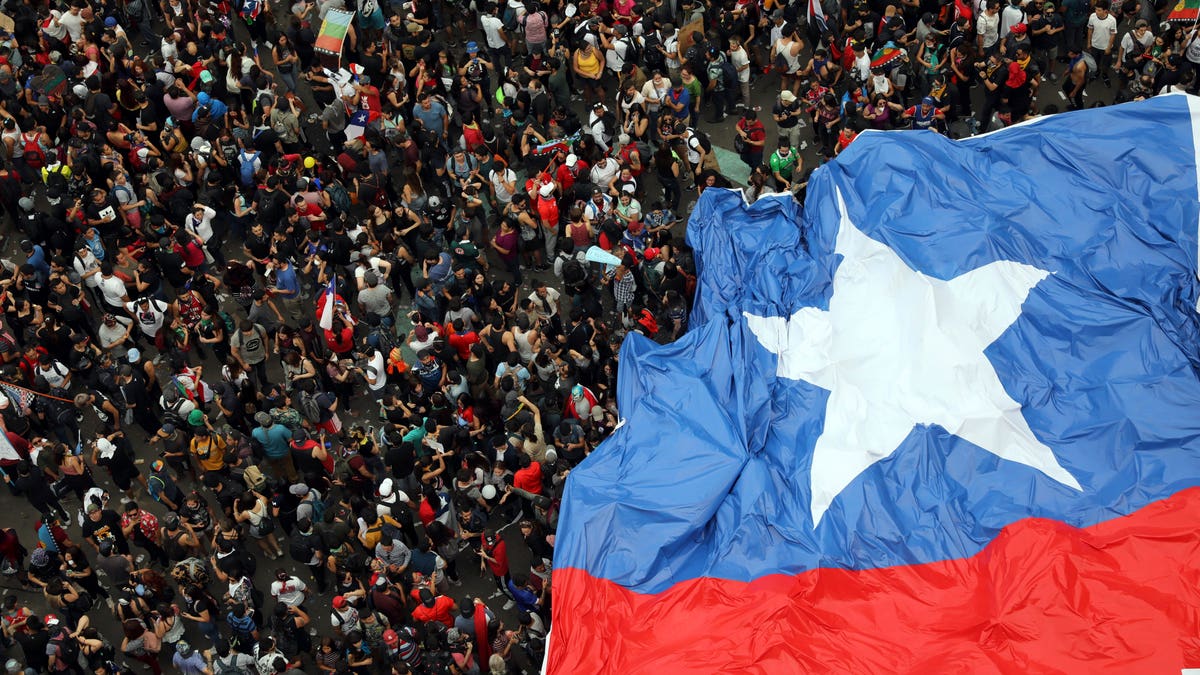
People gather during an anti-government protest in Santiago, Chile, Friday, Oct. 25, 2019. At least 19 people have died in the turmoil that has swept the South American nation. The unrest began as a protest over a 4-cent increase in subway fares and soon morphed into a larger movement over growing inequality in one of Latin America's wealthiest countries. (AP Photo/Rodrigo Abd)
BOLIVIA ERUPTS IN VIOLENCE AFTER EVO MORALES' NEAR OUTRIGHT ELECTION WIN, VOTE-COUNT DELAY
The 1 million people protesting are roughly five percent of Chile's entire population.
The protests, Lagos said, are bigger than any that occurred during the dictatorship of Gen. Augusto Pinochet decades ago or under democratic governments that followed.
Piñera served an earlier term as president, from 2010 to 2014.
On Friday, hundreds of trucks drove slowly on a main highway that skirts Santiago, where stone-throwing protesters have fought riot police for more than a week. Some Chileans in cars and motorcycles joined the protest, which was held to demand an end to private highway tolls.
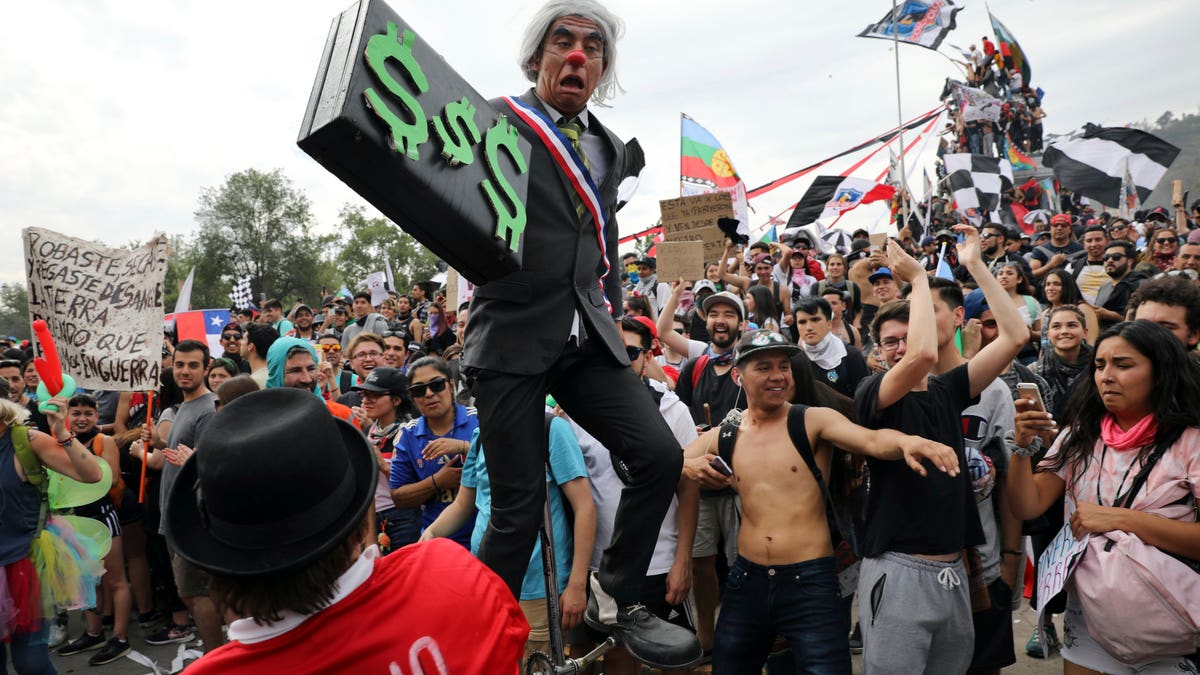
An artist performs as Chile's President Sebastian Pinera holding a briefcase embellished with dollars signs, during an anti-government protest in Santiago, Chile, Friday, Oct. 25, 2019. At least 19 people have died in the turmoil that has swept the South American nation. The unrest began as a protest over a 4-cent increase in subway fares and soon morphed into a larger movement over growing inequality in one of Latin America's wealthiest countries. (AP Photo/Rodrigo Abd)
Most car drivers pay between $35 and $130 a month to use highways around Santiago, depending on how much time they spend on the roads. Truckers pay much more because of the long distances that they travel.
Many Chileans earn between $560 and $760 a month, making it hard to pay for basic needs, let alone drive on the highways.
There will be no further highway toll fee increases this year under Chilean law, Transport Minister Rafael Moreno said.
Operators of some subway lines in Santiago also stopped service, further disrupting a transport network affected by burning and vandalism of stations in some parts of the city.
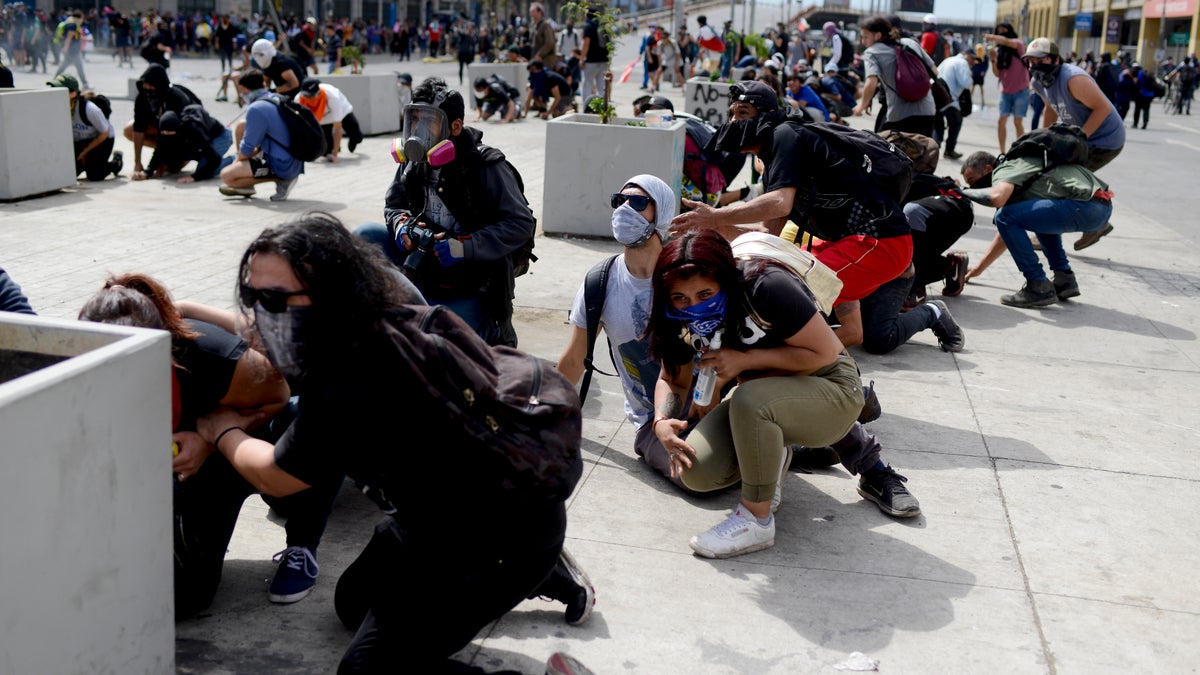
Anti-government protesters take cover just around the corner from the Congress building, during clashes with police in Valparaiso, Chile, Friday, Oct. 25, 2019. A new round of clashes broke out Friday as demonstrators returned to the streets, dissatisfied with economic concessions announced by the government in a bid to curb a week of deadly violence.(AP Photo/Matias Delacroix)
About 40 percent of Santiago's metro was functioning on Friday, though several thousand buses have been deployed in an attempt to make up for the disruption.
Struggling to contain the strife, Piñera's administration announced increases in the minimum wage and the lowest state pensions, rolled back the subway fare increase and put a 9.2 percent increase in electricity prices on hold until the end of next year.
Flanked by elderly Chileans, Piñera on Friday signed a measure that would raise minimum pensions of $150 by 20 percent, an increase that would benefit an estimated 600,000 people.
Most of the demonstrations over the high cost of medicine, water and other basic needs have been peaceful. But instances of arson, looting and alleged brutality by security forces have shocked many in a nation known for relative stability.
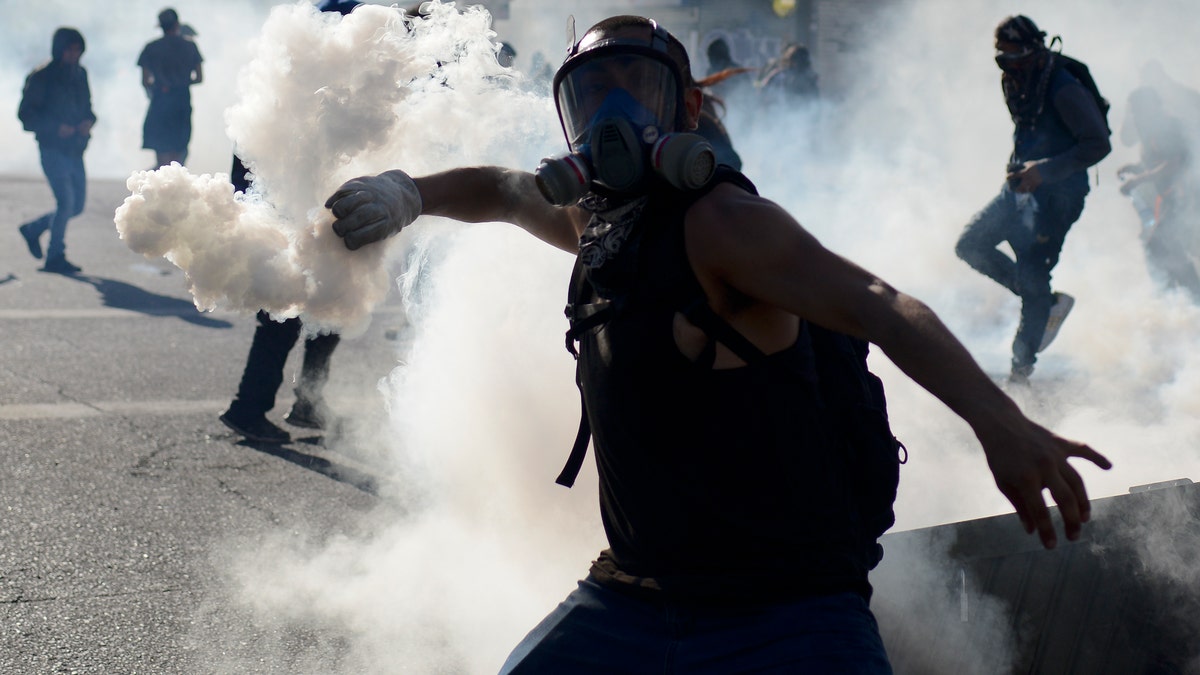
An anti-government protester returns a tear gas canister to police during clashes in Valparaiso, Chile, Friday, Oct. 25, 2019. A new round of clashes broke out Friday as demonstrators returned to the streets, dissatisfied with economic concessions announced by the government in a bid to curb a week of deadly violence.(AP Photo/Matias Delacroix)
According to Chile's human rights watchdog organization, more than 2,000 people have been detained and over 500 injured.
The government has declared a state of emergency and imposed curfews in 12 out of Chile's 16 regions.
Former Chilean President Michelle Bachelet, now the United Nations' top official on human rights, will send a three-member team to Chile to examine allegations of violations, spokeswoman Ravina Shamdasani said in Geneva. The mission, from Oct. 28-Nov. 22, will be based in Santiago and will visit other cities.
CLICK HERE TO GET THE FOX NEWS APP
Shamdasani said Chilean lawmakers had called for the U.N. office to send a mission and the government also invited it. Bachelet served two terms as Chile's president and was Piñera's predecessor.
The Associated Press contributed to the report

